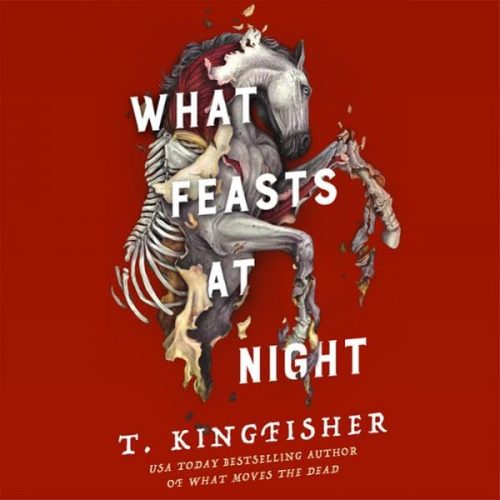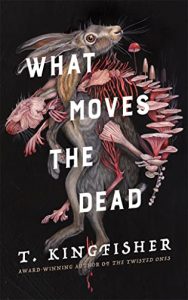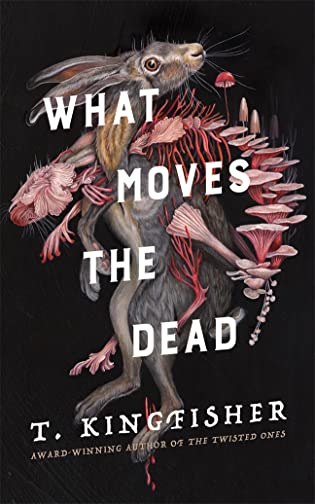 What Feasts at Night (Sworn Soldier, #2) by T. Kingfisher
What Feasts at Night (Sworn Soldier, #2) by T. Kingfisher Narrator: Avi Roque
Format: audiobook, eARC
Source: supplied by publisher via NetGalley
Formats available: hardcover, ebook, audiobook
Genres: horror
Series: Sworn Soldier #2
Pages: 160
Length: 5 hours and 2 minutes
Published by Macmillan Audio, Tor Nightfire on February 13, 2024
Purchasing Info: Author's Website, Publisher's Website, Amazon, Barnes & Noble, Kobo, Bookshop.org, Better World Books
Goodreads
The follow-up to T. Kingfisher’s bestselling gothic novella, What Moves the Dead .
Retired soldier Alex Easton returns in a horrifying new adventure.
After their terrifying ordeal at the Usher manor, Alex Easton feels as if they just survived another war. All they crave is rest, routine, and sunshine, but instead, as a favor to Angus and Miss Potter, they find themself heading to their family hunting lodge, deep in the cold, damp forests of their home country, Gallacia.
In theory, one can find relaxation in even the coldest and dampest of Gallacian autumns, but when Easton arrives, they find the caretaker dead, the lodge in disarray, and the grounds troubled by a strange, uncanny silence. The villagers whisper that a breath-stealing monster from folklore has taken up residence in Easton’s home. Easton knows better than to put too much stock in local superstitions, but they can tell that something is not quite right in their home. . . or in their dreams.
My Review:
It’s not mushrooms this time. Not that there isn’t something creeping around the old hunting lodge that retired soldier Alex Easton inherited from their family in the remoter parts of their native Gallacia. And not that Easton isn’t still experiencing PTSD and a whole, entire and entirely justified case of the collywobbles at even the thought of anything that might possibly have to do with mushrooms after the fungus-powered monstrosities in Easton’s first outing, What Moves the Dead.
In fact, after the events in What Moves the Dead, it’s not at all surprising that Easton is searching for a bit of peace and quiet. It’s just a surprise that they’ve gone home to Gallacia to find either of those things. Because it is clear from Easton’s opening remarks regarding this trip to their homeland, the whys and wherefores of the whole thing, and their thoughts and feelings about Gallacia and anything to do with it that they would much rather have stayed in Paris.
As Easton makes VERY clear on the way to that hunting lodge they haven’t visited in the past ten years, at least in the conversation they are having with themselves inside the confines of their own head, they are feeling very put upon by this whole trip. Their reluctance, at least, is apparent in the conversation they are having aloud, the one between themselves, their very good horse Hob, their batman and general factotum Angus, and Angus’ mustache, which seems to convey rather strong opinions of its own in spite of not actually being able to say a word.
Besides, it’s all Angus’ fault. Well, Angus’ fault as well as Easton’s own sense of propriety – no matter how much they’d like to let THAT go hang itself at the moment. Because Eugenia Potter, that redoubtable English mycologist who so ably assisted them with the fungal infestation in the House of Usher in What Moves the Dead, has been invited to Gallacia to observe the local fungi, with Easton as her ostensible host.
Honestly, it’s to further Miss Potter’s romance with Angus, but no one is admitting that. It wouldn’t be proper.
Easton planned to arrive at the lodge a few days ahead of Miss Potter, expecting to find the place in reasonable shape, just needing a bit of restocking and tidying up. That’s how Easton remembers it from the last time they were there. But Easton also remembers a caretaker taking care of the place, a caretaker that Easton has been paying a salary to for years and years, and as recently as the preceding month.
So, it’s obvious when Easton and Angus arrive that things are not quite what they expected. The house is a mess, the caretaker is a few months dead, and no one seems to be willing to be employed to help Easton and Angus get the place cleaned up and cleaned out, in spite of the good wages in hard currency that Easton is more than willing to pay in this poverty-stricken village where those things are seldom seen or even heard of.
Which is the point where Easton should have rescinded the invitation to Miss Potter and run back to Paris as fast as their horse’s legs could carry them. Because there’s something uncanny about the caretaker’s death, and there’s something dangerous haunting the old hunting lodge.
At least, this time, it’s not mushrooms.
 Escape Rating A-: I’m not sure whether to say that What Feasts at Night isn’t quite as creepy as What Moves the Dead, or to say that it is even creepier. Let’s say I’m creeping along that fence and not sure which side I’ll fall off onto.
Escape Rating A-: I’m not sure whether to say that What Feasts at Night isn’t quite as creepy as What Moves the Dead, or to say that it is even creepier. Let’s say I’m creeping along that fence and not sure which side I’ll fall off onto.
What Moves the Dead was a creepy story that turned out to be a bit more scientifically inclined than anything that happens within it might lead the reader to expect.
What Feasts at Night, very much on the other hand, reads much more like a fever dream story about pneumonia and PTSD. Or a ghost story about PTSD. Or a nightmare about a ghost that’s strangely cured or killed through PTSD that only masquerades as being about pneumonia. Or all of the above.
The fever dream aspects of the story, particularly as the pneumonia, or the wandering local vampire/ghost creeps its way into the dreams of both Alex Easton and the grandson of the bitter old woman they finally manage to hire to take care of the house, manage to both make the story even creepier AND slow it down at the same time. Because for the longest time not much happens except in dreams and that’s not a quick process until the end. Not helped at all by the fact that no one local will really EXPLAIN anything about what might be happened, and Easton clearly didn’t get told the right stories when they were growing up.
But at that point, where the dream and the ghost and Easton’s PTSD all emerge on the same battlefield, it’s chilling and riveting and every frightening thing the reader has been expecting all along. It just feels like it takes a while to get there. But then, that’s what dreams do.
One thing that does kick the story along, frequently, often, and with more than a bit of a rueful laugh, is that it’s clear from the volume of conversations that Easton has with themself that the author has never met a Fourth Wall she wasn’t more than willing to batter her way through head first, whether using her protagonist’s head or even her own.
Which is one of the things that made listening to What Feasts at Night so much creepy fun, as the narrator, Avi Roque, has a rough, smoky voice that is perfect for Easton as it lets us inside their wry, sarcastic, self-deprecating head even as they tell both themselves and us that they realize that they should have known better at so many points along the way of the story they are now telling, if only they hadn’t let their logic get in the way of observing what was actually happening around them.
I enjoy Alex Easton’s voice, even when I’m not nearly so certain about the story they are telling. Horror is not my jam, but in this case I’m here for the characters, and Easton’s perspective is compelling even when the story they are in the middle of is creeping me right the hell out.

 What Moves the Dead by
What Moves the Dead by